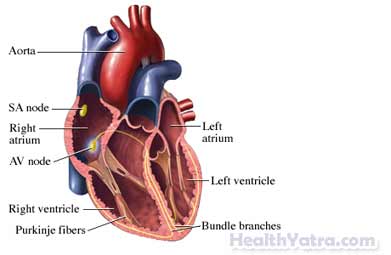تعريف
Electrical signals in your heart make the heart muscles contract, pumping blood through your body. If the electrical signals are not flowing well through the heart, this can create serious problems.
An electrophysiology study is a test where electrode wires are passed through a blood vessel and into your heart. This electrode can record or create electrical activity. This can help find any problems with the flow of electricity in your heart.

أسباب هذا الإجراء
An electrophysiology study is performed to:
- Find the cause of abnormally slow heart rhythms (bradycardias)
- Find the source of abnormally fast heart rhythms (tachycardias)
- Provoke and diagnose heart arrhythmias (irregular heart beats) that occur infrequently
- Reveal suspected arrhythmias
An electrophysiology study may also be used to assess:
- Risk for sudden death
- Symptoms of unknown cause
- Response to anti-arrhythmic therapy
- Need for a pacemaker
- Need for an implantable cardioverter defibrillator
- Need for cryoablation (destruction of some heart cells by freezing)
المضاعفات المحتملة
المشاكل من هذا الإجراء نادرة ، لكن جميع الإجراءات تنطوي على بعض المخاطر. سيراجع طبيبك المشاكل المحتملة ، مثل:
- Excess bleeding
- العدوى
- Blot clots
- Injuries to blood vessels or the heart
- عدم انتظام ضربات القلب
- نوبة قلبية
A person’s risk level is very individual. It may relate to the specific arrhythmia suspected and any underlying حالات طبيه.
ما يمكن توقعه
قبل الإجراء
You doctor may order the following tests:
- تحاليل الدم
- Electrocardiogram (ECG) to record the heart’s electrical activity
- الأشعة السينية الصدر
Talk to your doctor about any medications, herbs, or supplements you are taking. You may be asked to stop taking some medications up to one week before the procedure, like:
- الأسبرين أو غيره من العقاقير المضادة للالتهابات
- Blood-thinning drugs, such as warfarin
- Anti-platelet drugs, such as clopidogrel
لا تأكل أو تشرب أي شيء بعد منتصف الليل في اليوم السابق لعملية الجراحة، ما لم يخبرك طبيبك بخلاف ذلك.
التخدير
A local anesthetic will be given by needle. It will numb the area where the catheter will be inserted. You will also receive a mild sedative through an IV in your arm. This will help you to relax during the test.
وصف الإجراء
You will be asked to lie down on an examination table. Electrodes will be placed on your chest. The electrodes will help to monitor your heart rhythm during the test. An area on your thigh, neck, or just below your collarbone will be cleaned. A thin electrical wire will be inserted into a blood vessel in that area.
The electrode will be passed through the blood vessel and into your heart. Your doctor will be able to see the progress of the catheter with the help of x-rays on a screen. The tip of the electrode can send electrical signals to your heart. The signals will make the heart beat at different speeds. Your heart rhythm will be recorded to look for abnormalities. The tip of the electrode can also record electrical activity at specific spots in your heart muscle.
كم من الوقت سيستغرق ؟
The length of the test will vary based on what your doctor is investigating. The test may take 2-4 hours or more to complete.
هل سيكون هناك ألم؟
If the doctors induce an arrhythmia, you may feel palpitations, shortness of breath, chest discomfort, or you may even lose consciousness. The medical team can usually control arrhythmias with medicines, but they may need to administer a shock to stop some rhythms. If they need to do this, you will receive more sedation so that you do not feel pain.
رعاية ما بعد العملية
If your doctor does not need to do additional procedures, you may be able to go home after about six hours. However, you may need to remain in the hospital for up to 24 hours if additional procedures are done during the study.
في مركز الرعاية
- ECG and blood studies may be done.
- You will likely need to lie still and flat on your back for a period of time. A pressure dressing may be placed over the area where the catheter was inserted to help prevent bleeding. It is important to follow the nurses’ directions.
- You will need to rest in bed until the sedative has worn off. Your heart rate and blood pressure will be monitored. You will also be checked for swelling or infections. If necessary, you may be given pain medicine. After resting for at least 4-6 hours, your doctor will let you know if you can go home that day or if you need to be admitted for more treatment or observation. If you are discharged on the same day as the test, you should have someone drive you home.
The results of the study may be available before you leave the hospital or in the next few days. Your doctor will notify you if you need any treatment.
في البيت
عندما انت العودة إلى المنزل، قم بما يلي للمساعدة في ضمان التعافي السلس:
- Do not lift heavy objects or engage in strenuous يمارس or sexual activity as directed by your doctor.
- Change the dressing around the insertion area as instructed.
- تناول الأدوية حسب التعليمات.
- Ice may help decrease discomfort at the insertion site. You may apply the ice for 15-20 minutes at a time. Place a towel between the ice pack and your skin.
- تأكد من اتباع تعليمات طبيبك.
استدعاء الطبيب
Call your doctor if any of the following occurs:
- علامات الإصابة, بما في ذلك حمى وقشعريرة
- Redness, swelling, increasing pain, excessive bleeding, or any discharge from the insertion site
- السعال، ضيق التنفس، أو ألم في الصدر
- Your leg feels cold, turns white or blue, or becomes numb or tingly
- Lightheadedness or weakness
إذا كنت تعتقد أن لديك حالة طارئة ، فاتصل بالمساعدة الطبية على الفور.
